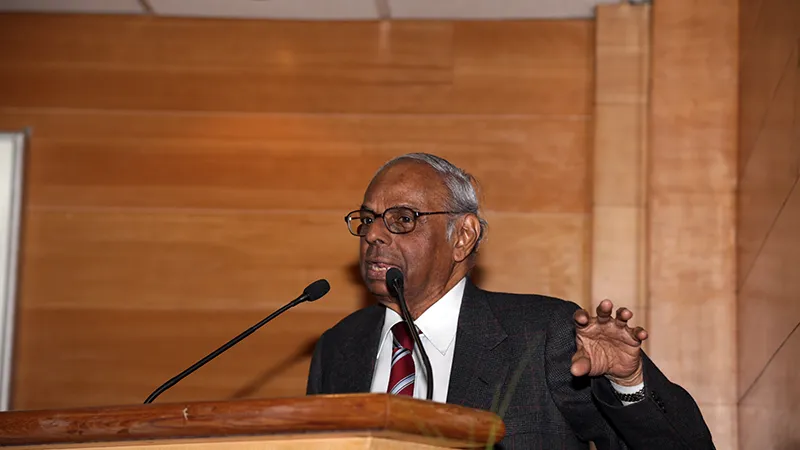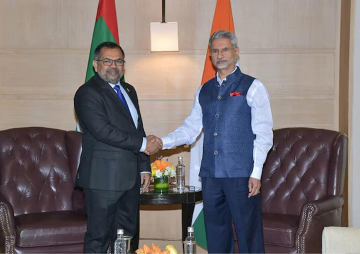Dr. C. Rangarajan, Chairman of the Prime Minister's Economic Advisory Council, has made an impressive case for "economic statesmanship" which he said would ensure inclusive growth and stability in India as well as globally.

Dr. C. Rangarajan, Chairman of the Prime Minister’s Economic Advisory Council, has made an impressive case for "economic statesmanship" which he said would ensure inclusive growth and stability in India as well as globally.
Dr. Rangarajan said this while delivering the keynote address on "Global economic crisis: Causes and consequences" at Observer Research Foundation, Delhi, on Tuesday, February 12, 2013. The occasion was the release of ORF’s latest publication "The Global Economic Meltdown: Perspectives from India and EU", by Dr. Rangarajan.
The book, edited by ORF Senior Fellow Jayshree Sengupta, is a compilation of diverse perspectives on the crisis. It is a result of two seminars - one in Berlin and the other in Delhi - organised by ORF and Rosa Luxemburg Stiftung, Germany.
During his address, Dr. Rangarajan began by describing the dimensions of the financial crisis. The American subprime mortgage collapse, he said, brought failure and foreclosures which led to defaulting on securitized debt sold to institutions in the U.S. and abroad. These toxic assets were the spark of the financial crisis, but were not its root cause. In fact, the 2008 crisis originated not in the real sector or in foreign exchange, but from the basic excesses of the financial sector. Regulatory failure allowed funds to flow from heavily-regulated areas to lightly-regulated ones in a cycle called regulatory arbitrage, as uneven parameters encouraged risky financial behaviour.
Dr. Rangarajan argued that the 2008 crisis has fundamentally changed the world financial system by laying bare the fact that markets can’t simply be left alone, and expected to self-regulate. Rather, the crisis has revealed the existence of persistent imbalances which must be regulated to avoid dangerous speculation. The liberal fiscal policy needed to counter these imbalances has created another tension, however - that between growth and austerity. Indeed, while regulation is necessary, we must also encourage innovation. Finding a balance between those regulation and innovation is the path towards growth and equality - true economic statesmanship.
Moderating the event, ORF Director Sunjoy Joshi stressed that the 2008 crisis was not simply a "black swan" event, but rather a consequence of regulatory failure which led to a chain collapse of financial structures. In response to this crisis, governments and regulatory bodies began unprecedented interventions into world markets, including bailouts, new restrictions on lending, and consumer protection organizations. Joshi described the crisis as a "great leveller" in which strong and weak economies alike constricted. He also questioned the causes of India’s surprising resilience in the face of the global downturn, and suggested that India’s "decoupling" was perhaps a result of the country’s relatively nascent financial network. Joshi introduced "The Global Economic Downturn" as a joint ORF-RLS effort to investigate the origins and responses to the crisis, based on papers presented at conferences held in Berlin and New Delhi.
Ms Jayshree Sengupta described the process which led to the 2013 publication of "The Global Economic Downturn" by Academic Foundation New Delhi - a two-year effort of compiling conference papers of German and Indian scholars. She introduced the contents of the book, and noted Mr M.K. Venu’s chapter, which asserts that India’s strength is in robust rural demand, as well as the contribution by Mr Samir Saran and Mr Vivan Saran of ORF, which investigates the sustainability of India’s three flagship structures for inclusive growth.
Mr. Venu, the Managing Editor of The Financial Express, opened by noting Dr. Rangarajan’s had argued in the interviews he gave to him that India would not suffer as deeply from the crisis as would the developed world. Mr. Venu said that India’s 8.4 percent growth following the crisis attests to the veracity of Mr. Rangarajan’s comment, but that an "infrastructure lag" continues to hinder India’s growth. He suggested that infrastructure development in Indian states that have languished economically has now begun to propel new economic activity and growth in those states - activity which begins with rural demand. He closed by asserting that China and India, states which weathered the crisis well, have withstood many crises and are intrinsically well-prepared to do so.
Dr. Carsten Krinn, RLS’s Regional Representative for South Asia, raised three questions: First, how is the Indian government to deal with those who are made economically redundant by modernisation and development? Second, how can inclusive growth be encouraged vis-à-vis India’s quest for GDP growth? Third, with economic inequality representing the greatest threat to the Indian government’s legitimacy, how can officials push for more responsibility and accountability? He expressed the hope that ORF and RLS can collaborate to explore those issues in a future conference.
Text of Dr. C. Rangarajan’s keynote address
(This report is prepared by James Tyson, Fulbright Fellow, at Observer Research Foundation, New Delhi)
The views expressed above belong to the author(s). ORF research and analyses now available on Telegram! Click here to access our curated content — blogs, longforms and interviews.




 PREV
PREV

